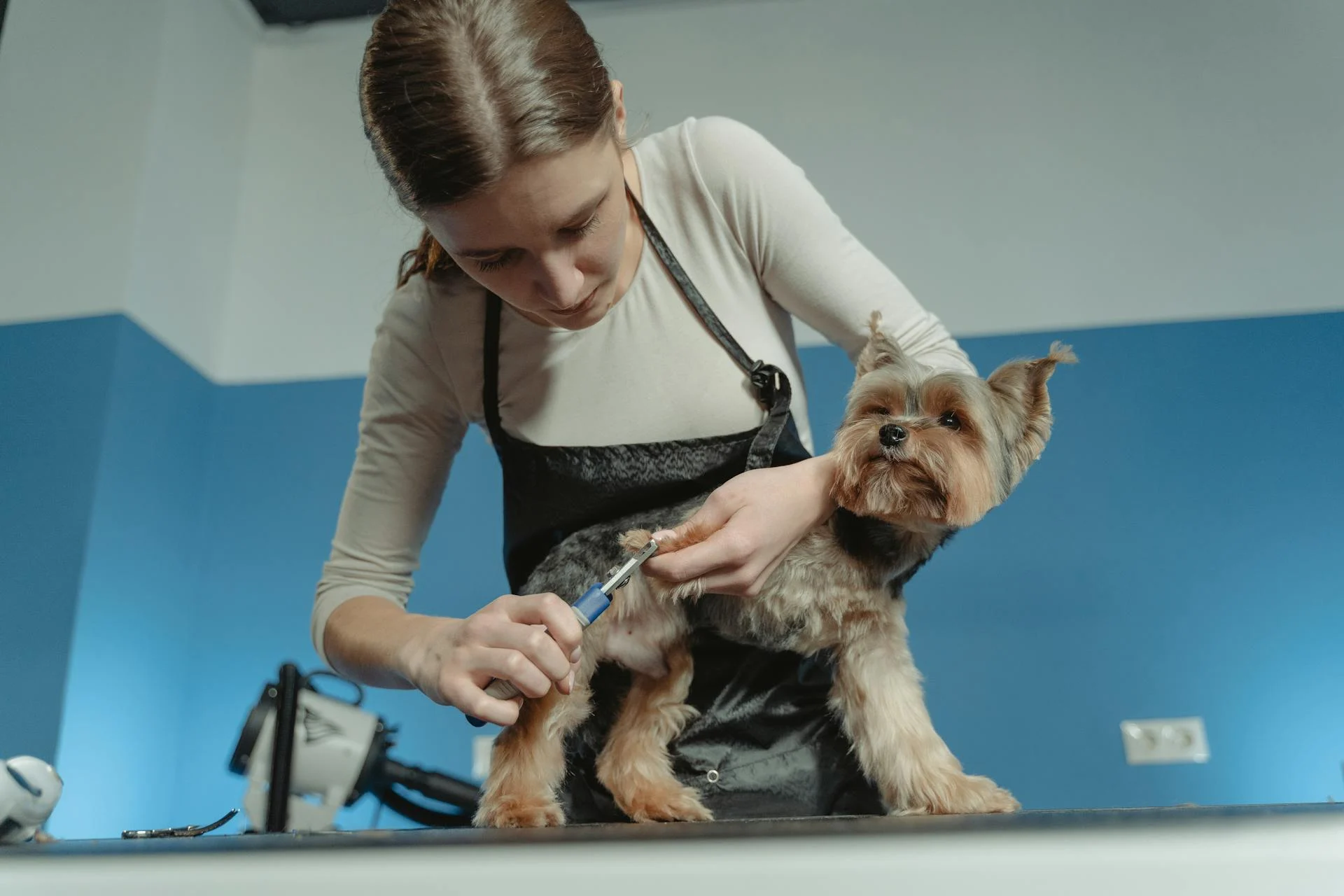
Newfoundlands are known for their gentle giant reputation, but they're not the only breed that shares similar characteristics. Dogs like the Newfoundland have a strong instinct to please their owners and are often described as "velcro dogs" due to their tendency to stick close by.
One of the key characteristics of dogs like the Newfoundland is their high energy level, requiring regular exercise to keep them happy and healthy. They need daily walks and playtime to burn off excess energy.
Newfoundlands are also known for their intelligence, which makes them highly trainable. They thrive on structure and clear communication, responding well to positive reinforcement training methods.
Dogs like the Newfoundland have a strong instinct to protect their family and territory, making them natural guard dogs.
Physical Characteristics
Newfoundland dogs are truly massive, with males standing 71 cm tall and weighing 68 kg on average. Their muscular build and broad chest make them a powerful sight.
Their coats are a mix of black, brown, grey, or white and black, and they have a double-layered coat that's perfect for withstanding cold winds and water. The outercoat is oily, while the undercoat is dense and soft.
Newfoundlands have webbed feet, which enable them to swim long distances with ease. Their large lung capacity also makes them natural swimmers.
Despite their size, females are slightly smaller, standing 66 cm tall and weighing 54 kg on average.
Health and Care
Newfoundlands are prone to certain health issues due to their large size, so it's essential to be aware of these potential problems. Regular veterinary check-ups can help identify any issues early on.
Newfoundlands are susceptible to joint problems, including dysplasia, which can cause arthritis in the hip and elbow joints. Newfie neck is also a common issue, encompassing slipped discs, pinched nerves, arthritis, and injuries to the neck.
Here are some common health issues affecting Newfoundlands:
- Dysplasia: A nasty arthritic joint condition commonly afflicting larger dogs, usually in the hip and elbow joints.
- Newfie neck: Umbrella term for slipped discs, pinched nerves arthritis, and injuries to the neck that is uniquely common in Newfies due to collar strain and overly strenuous exercise.
- Gastric Dilatation-Volvulus: A form of life-threatening bloat that is more common in deep-chested breeds, like Newfies, where the stomach fills with gas/food and twists.
- Osteosarcoma: Typically heralded by signs like limping, this aggressive bone cancer is most common in large breeds, such as the Newfoundland.
- Heart problems: Heart conditions and especially dilated cardiomyopathy (DCM) are common among Newfies. It is treatable but frequently leads to congestive heart failure later in life.
- Eye problems: Eyelid problems like entropion and ectropion are fairly common among Newfies, but more severe conditions like glaucoma are known to plague them too.
Newfoundlands can also be prone to obesity due to their massive size, so monitoring their weight and diet is crucial. A high-quality, balanced dog food that suits their age and activity level is essential to maintain a healthy weight.
Additional reading: Bernese Mountain Dog Weight Kg
Factors Affecting Size

Newfoundlands are a large breed, and their size can be influenced by genetics. Genetics play a significant role in determining a Newfoundland's final size.
Nutrition during their growth stages also plays a crucial role in determining their final size. A well-balanced diet is essential for a Newfie's overall health and growth.
Newfoundlands can continue to grow until about 18 to 24 months old, with most of their height, bone, and muscle growth complete by 2 years of age. This means that their growth rate can be affected by how well they are fed during this period.
Finding an ethical breeder is important, as they can provide accurate health records for the puppy, including results from genetic testing of the parents. This can help ensure that you adopt a healthy Newfie.
Recommended read: American Bully Xl Size
Health and Care
Newfoundland dogs require regular interaction with other dogs due to their social nature.
Their thick double coat needs regular grooming to prevent matting and shedding, which can be a challenge, especially during spring and fall shedding seasons.

You'll need a good vacuum with attachments, like telescoping wands and crevice tools, to keep up with dog hair.
A vacuum with a HEPA-rated filter is a must if anyone in the home is allergic to dog hair, as it can catch the most allergens.
Regular veterinarian check-ups are essential to monitor the health and development of your Newfoundland, especially since they're prone to severe bloat, bone cancer, and hip dysplasia.
Health and Conditions
Newfoundlands are a big responsibility, not just because of their size, but also because of their potential health issues. They have a relatively modest lifespan of 8 to 10 years.
Dysplasia is a common arthritic joint condition that affects larger dogs, often in the hip and elbow joints. This can lead to painful mobility issues.
Newfie neck is a unique condition that affects the neck, causing slipped discs, pinched nerves, arthritis, and injuries due to collar strain and strenuous exercise. It's essential to exercise them carefully.

Gastric Dilatation-Volvulus, or bloat, is a life-threatening condition that requires immediate medical attention. It's more common in deep-chested breeds like Newfies.
Osteosarcoma, an aggressive bone cancer, is common in large breeds like Newfies. It often starts with limping.
Heart problems, including dilated cardiomyopathy (DCM), are common among Newfies. While treatable, it can lead to congestive heart failure later in life.
Here are some common health issues to watch out for in Newfoundlands:
- Dysplasia
- Newfie neck
- Gastric Dilatation-Volvulus (bloat)
- Osteosarcoma
- Heart problems (including DCM)
- Eye problems (such as entropion, ectropion, and glaucoma)
Food & Diet Requirements
Newfoundland Dogs require a lot of high-quality dog food, especially as puppies, with a minimum of 25% to 32% protein.
As they grow, you can switch to a more moderate maintenance diet with 20% to 24% protein once they reach their full size at about 2 years old.
Newfoundland puppies do best with high-protein puppy food, which should include a healthy balance of carbs, veggies, and nutrients like minerals and vitamins.
You can supplement their diet with protein sources like lamb, chicken, turkey, duck, eggs, beef, and fish for a more varied diet.
Take a look at this: Why Do Dogs like Cat Food

Green beans, carrots, broccoli, and sweet potatoes are great veggies to add to their meals, packed with vitamins and healthy dietary fiber.
It's essential to ensure they're eating the right amount of calories and getting a complete and balanced diet, so consult with your vet if you're unsure.
Newfoundland Dogs are prone to obesity due to their massive size, so monitoring their weight and diet is crucial.
You can also consult with your veterinarian for a personalized feeding plan to ensure your Newfoundland is getting the proper nutrients.
Indoor vs Outdoor
Newfoundlands are adaptable to both indoor and outdoor living, but they require regular exercise and outdoor time to stay happy and healthy.
While they can be indoor dogs, Newfoundlands need access to a secure and spacious outdoor area for regular exercise and playtime.
Regular exercise is crucial for Newfoundlands, and it's recommended they get at least some time outside every day.
Water Rescue
Newfoundlands are famous for their water rescue abilities, bred from a mix of Retrievers, Spaniels, Mastiffs, and other working breeds in Canada to create a more rugged working breed.
Their most prominent job was to rescue people who fell in the water, and most famously, a Newfoundland was said to have saved Napoleon Bonaparte’s life at one point.
Temperament and Traits
Newfoundland dogs are known for their sweet and gentle temperament, earning them the nickname "gentle giants" or "nanny dogs".
Their patient and even-tempered personalities make them ideal family dogs, particularly good with children.
In families where a Newfoundland is present, it's common for children to take their first steps while holding on to the dog.
Bravery, intelligence, and loyalty are other traits that stand out in the Newfoundland dog breed.
A deep, imposing bark makes them perfect guardians, but they still need supervision due to their large size.
Newfoundland dogs are great "bigger siblings" for other dogs and often even cats, but it depends on their individual temperament.
Early socialization is key to tempering hormonal impulses like territorialism and aggression in adolescent males.
Owning a Newfoundland
Owning a Newfoundland can be a wonderful experience, but it's essential to consider their large size and exercise needs. Newfoundlands are known for their sweet and devoted nature, making them great house dogs and loyal companions.
They require quite a bit of space, both indoors and outdoors, to exercise and live comfortably. Newfoundlands are a great fit for families with large yards or homes with spacious living areas.
Their loyal nature means they thrive on attention and interaction, so be prepared to spend quality time with your Newfoundland.
Breed Puppies
If you're lucky enough to find a Newfoundland puppy, you'll soon discover that they're some of the sweetest and most easy-going pups you'll ever meet.
Newfoundland puppies can be found through reputable breeders, who can be located through regional chapters of the Newfoundland Club of America (NCA). Joining or meeting members of your regional chapter can be a great way to learn about the breed and find a trustworthy breeder.
To find a responsible and reputable breeder, there are several tips to keep in mind. Always ask to visit a breeder's facility, as an ethical breeder will be happy to accommodate you and show you their premises.
Asking to see a litter's parents in person or asking for photos of them if they don't live on-site can give you a visual idea of what a puppy may look like at maturity. You should also ask to see any genetic and health screening results, if not already offered, to ensure the puppy's health.
Don't be afraid to ask questions! A responsible breeder will be happy to clarify any concerns or questions you may have. Some examples of questions to ask include how long they've been breeding, whether they have formal certifications, and anything else important that springs to mind.
Here are some questions to ask a potential breeder:
- How long have you been breeding Newfoundlands?
- Do you have any formal certifications?
- Can I see genetic and health screening results for the puppies?
- Can I visit your facility and meet the parents of the litter?
Owning Essentials
Owning a Newfoundland requires a significant investment in essential items, including a high-quality food bowl that can withstand the breed's tendency to drool excessively.
Newfoundlands are massive dogs, with males weighing up to 150 pounds, so you'll need a sturdy dog bed that can support their weight.
They have a thick double coat that sheds heavily, so be prepared to invest in a good vacuum cleaner and a deshedding tool.
Newfoundlands are natural swimmers, but they can also be prone to hip dysplasia, so regular exercise and joint supplements are a must.
Their massive size means they need plenty of space to move around, so a spacious living area or yard is a must-have.
Newfoundlands are known for their intelligence and trainability, but they can be stubborn at times, so consistency and positive reinforcement are key when training them.
Their thick coat requires regular grooming, including brushing and nail trimming, to prevent matting and overgrowth.
They are also prone to eye problems, so regular eye exams and cleaning are essential.
Are Good House?
Newfoundlands are known for their sweet and devoted nature, making them great house dogs and loyal companions.
They require quite a bit of space, both indoors and outdoors, to exercise due to their large size.
Their gentle nature means they're often a good fit for families with children, but they still need proper training and socialization to ensure good behavior.
Newfoundlands are natural-born swimmers, so if you live near a lake or ocean, they'll love spending time in the water.
However, their thick coat requires regular grooming to prevent matting and tangling, which can be a big responsibility for some owners.
Frequently Asked Questions
What dog breed is similar to Newfoundland?
The Bernese Mountain Dog is a breed similar to the Newfoundland, sharing similar height, appearance, and weight. They make great family pets, getting along well with children and other pets.
Are newfypoos good dogs?
Newfypoos are friendly, playful, and protective dogs that make great companions for families and individuals alike. With proper socialization, they can thrive as gentle and well-behaved pets.
Sources
- https://www.goodhousekeeping.com/life/pets/advice/g1737/largest-dog-breeds/
- https://www.thecanadianencyclopedia.ca/en/article/newfoundland-dog
- https://www.akc.org/dog-breeds/newfoundland/
- https://www.dogster.com/dog-breeds/newfoundland
- https://www.forbes.com/advisor/pet-insurance/pet-care/newfoundland-dog-size/
Featured Images: pexels.com


